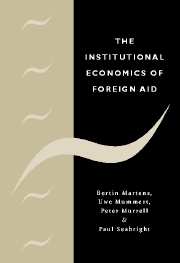Crossref Citations
This Book has been
cited by the following publications. This list is generated based on data provided by Crossref.
Zinnes, Clifford
and
Bolaky, Bineswaree (Aruna)
2002.
Harnessing the Power of Incentives: A Framework for Increasing Aid Effectiveness by Design.
SSRN Electronic Journal,
Copestake, James
2003.
Part II: Institutionalising Social Performance 5. Simple Standards or Burgeoning Benchmarks? Institutionalising Social Performance Monitoring, Assessment and Auditing of Microfinance.
IDS Bulletin,
Vol. 34,
Issue. 4,
p.
54.
Hefeker, Carsten
and
Michaelowa, Katharina
2003.
Can Process Conditionality Enhance Aid Effectiveness? The Role of Bureaucratic Interest and Public Pressure.
SSRN Electronic Journal,
2003.
Books Received.
Development and Change,
Vol. 34,
Issue. 1,
p.
210.
Gordillo, Gustavo
and
Andersson, Krister
2004.
From policy lessons to policy actions: motivation to take evaluation seriously.
Public Administration and Development,
Vol. 24,
Issue. 4,
p.
305.
Jacoby, Wade
2004.
The Enlargement of the European Union and NATO.
Obser, Andreas
2004.
Wissensmanagement in Politik und Verwaltung.
p.
217.
Ostrom, Elinor
and
Janssen, Marco A.
2005.
Globalisation, Poverty and Conflict.
p.
239.
Shirley, Mary M.
2005.
Handbook of New Institutional Economics.
p.
611.
Hare, Paul
2005.
EU Accession — Financial Sector Opportunities and Challenges for Southeast Europe.
p.
7.
Martens, Bertin
2005.
Why Do Aid Agencies Exist?.
Development Policy Review,
Vol. 23,
Issue. 6,
p.
643.
Hefeker, Carsten
and
Michaelowa, Katharina
2005.
Can process conditionality enhance aid effectiveness?.
Public Choice,
Vol. 122,
Issue. 1-2,
p.
159.
Heyneman, Stephen P.
2005.
On the International Dimension of Education and Social Justice.
Journal of Education,
Vol. 185,
Issue. 3,
p.
83.
Meessen, Bruno
Musango, Laurent
Kashala, Jean‐Pierre I.
and
Lemlin, Jackie
2006.
Reviewing institutions of rural health centres: the Performance Initiative in Butare, Rwanda.
Tropical Medicine & International Health,
Vol. 11,
Issue. 8,
p.
1303.
Paul, Elisabeth
and
Dabla-Norris, Era
2006.
What Transparency Can Do When Incentives Fail: An Analysis of Rent Capture.
IMF Working Papers,
Vol. 06,
Issue. 146,
p.
1.
Prokopijevic, Miroslav
2006.
Why Foreign Aid Fails.
SSRN Electronic Journal,
Copestake, James
2006.
Aid Impact and Poverty Reduction.
p.
53.
Paul, Elisabeth
2006.
A Survey of the Theoretical Economic Literature on Foreign Aid.
Asian-Pacific Economic Literature,
Vol. 20,
Issue. 1,
p.
1.
Fleck, Robert K.
and
Kilby, Christopher
2006.
World Bank Independence: A Model and Statistical Analysis of US Influence.
Review of Development Economics,
Vol. 10,
Issue. 2,
p.
224.
Acharya, Arnab
de Lima, Ana Teresa Fuzzo
and
Moore, Mick
2006.
Proliferation and fragmentation: Transactions costs and the value of aid.
Journal of Development Studies,
Vol. 42,
Issue. 1,
p.
1.





